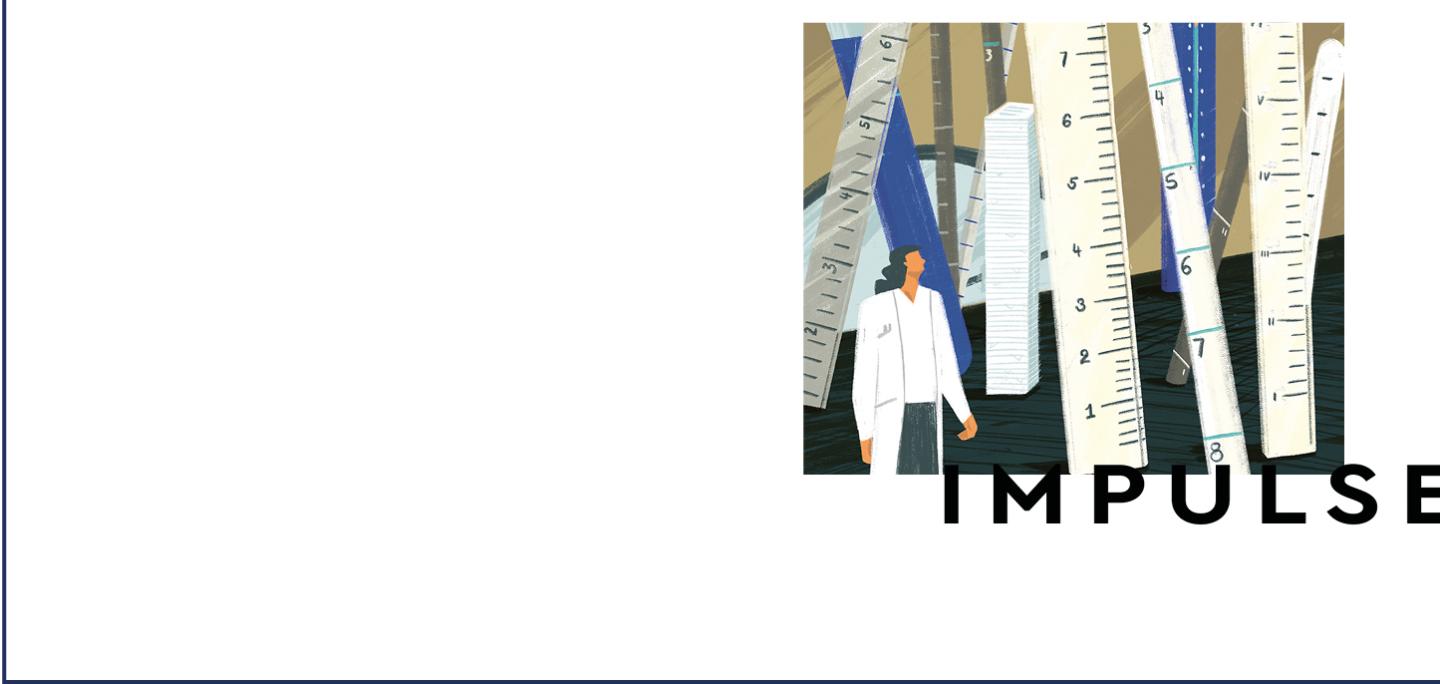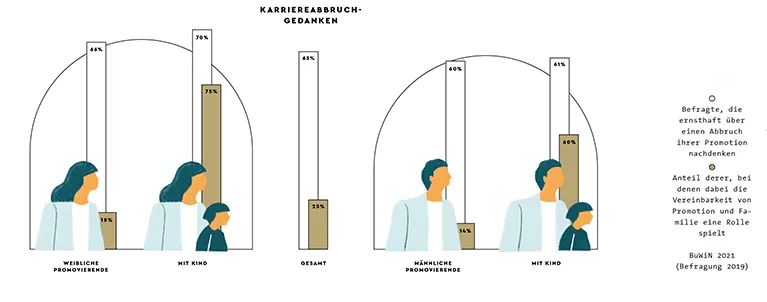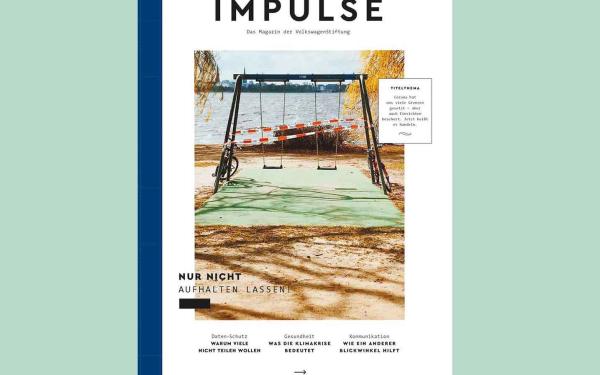
Andrea Wong
Careers in Science
Career planning has never been an easy matter for people working in research. Due to the pandemic, many are losing patience and optimism. How is the science system doing to counteract the impending brain drain?
The warning from the scientific community came promptly and is unmistakable: Already in the course of the first lockdown, Jutta Allmendinger, President of the Berlin Social Science Center (WZB), warned in general terms of an "appalling retraditionalization" of gender roles – and has since been proved right. Science is also not being spared. Studies show that female researchers are more likely than men to put their careers on hold when their families demand more time and attention during the corona crisis. In the spring of 2020, 57 percent of women submitted fewer publications than originally planned. For men, the figure was 37 percent. In a publish-or-perish world, that's a major setback.
But that's not all: after a good year of dealing with the pandemic, science managers like Jutta Allmendinger observed a "cooling-out" in their institutions. Cooling-out describes a phenomenon in which people lose interest in their work and alter focus. And this has nothing to do with gender. Cooling-out affects everyone, including people who possibly have what it takes to win a Nobel Prize. And this is precisely what should set off alarm bells in the scientific community.
It would be nice to have a model similar to those which predict the infection process and its ramifications. How many potential top researchers will switch careers if working conditions and gratification systems remain as they are today? No one knows. What is clear, though, is that science is not good at taking care of its people.
Doubts not only among the young
A staggering 92 percent of all researchers under the age of 45 are employed only on a temporary basis at universities. 10 to 15 percent of doctoral researchers at non-university research organizations experience abuse of power and bullying. And 37 percent of the 24,000 doctoral researchers surveyed in the DZHW's National Academics Panel Study (in German, pdf) (DZHW: German Centre for Higher Education Research and Science Studies) think about quitting: all the time (4), often (11) or occasionally (22). It is not only doctoral students who have the blues. In the pandemic, it also affects older researchers. In an OECD study, half of the respondents between the ages of 25 and 65 said they expected or had already suffered budget cuts. More than half expect the pandemic to make their jobs less secure and affect their career opportunities.
People carry on in old patterns [...] to keep a system alive that has actually outlived itself.
Lockdowns, closed borders, restricted access to laboratories and libraries are slowing down the science system worldwide. PhD students and postdocs, who were caught in the pandemic during the field research phase, are being hit particularly hard. Politicians in Germany tried to avert the looming debacle by extending the qualification period for young scientists by one year to 13 years – but only for those employed between March 2020 and March 2021. Research funders such as the DFG and the Volkswagen Foundation also relaxed funding periods and budgets.
There is an increasing danger that science will lose many talented young researchers because they perceive their career chances diminishing.
More time and more money certainly help to alleviate the distress. But they do not constitute a lasting remedy against cooling-out. Because in essence, everything remains the same, as sociologist Jens Maeße says: "People carry on in old patterns, attempting with minor extensions of deadlines to keep a system alive that has actually outlived itself." Maeße is researching how the pandemic is changing career paths in the field of economics. Spread over two survey phases, he is conducting interviews with 60 doctoral students, postdocs and professors in Germany and the UK. The initial interviews corroborate his assumption that "perhaps five to ten percent of researchers are able to effectively use the corona crisis for their careers" and attract attention via digital formats. "Profiteers are the well-connected singles who are free to invest their time in research. The majority, though, are just muddling through, and many will pull out completely," says Maeße.

Career retirement thoughts: Respondents who are seriously considering dropping out of their doctorate (transparent columns) versus proportion of those for whom the compatibility of doctorate and family plays a role (colored columns). Comparison female without child/with child (left) and male without child/with child (right).
Eliminate the weaknesses of the system
Since corona took hold, materials scientist Peter Gumbsch has seen two PhD students move who saw no future for themselves in science. "Young researchers have always had to deal with uncertain careers. In the pandemic, this uncertainty has increased," says Gumbsch, who was chairman of the German Science Council's Scientific Commission (Wissenschaftsrat, WR) until January 2021. Under his aegis, a working group screened the science system for weaknesses that have become particularly evident in the pandemic in order to learn from them for the future. "There is an increasing danger that science will lose many talented young researchers because they perceive their career chances diminishing," says Gumbsch.
So what needs to be done to make the system more "resilient", as the German Science Council puts it in a position paper (in German, pdf), also in terms of career paths? There is no shortage of ideas. Many of them come directly from the grassroots and range from more intensive to more individualized doctoral supervision to teaching relief, time vouchers and additional support staff for researchers with family responsibilities.
We have to look at the conditions under which research achievements come about and take them into account in subsequent evaluation.
All this will not be enough, though. In order to strengthen trust in the science system in the long term, new approaches to selecting the best minds are needed. We need a selection process that focuses on the individual researcher and stops the practice of decision-makers looking at quantitative indicators such as publications, citations or third-party funding. For those who may experience déjà vu with this message, this is, indeed, precisely what the German Science Council was calling for ten years ago, in November 2011 (Download, pdf - in German). But not much has happened since then.
"Qualitative benchmarks" instead of simple metrics
Selection by metrics persists because it is straightforward – and seemingly objective. However, the pandemic reveals just how misleading this is. Women researchers are not publishing less because they are worse at it, but because they demonstrably lack the time. "If a laboratory burns down, you can't blame it on the researchers. That's how you have to see the impairments that researchers experienced as a result of corona," says Mainz-based resilience researcher Klaus Lieb. "We have to look at the conditions under which research achievements come about and take them into account in subsequent evaluation".

Publication productivity: More published than planned (brownish), just as much published as planned (turquoise), less published than planned (white). Female professors without a child (far left), male professors without a child (middle left) versus female professors with a child (middle right) and professors with child (far right).
This puts Lieb firmly in line with the Science Council (WR), the German Rectors' Conference (HRK) and the German Research Foundation (DFG). Almost in chorus, they are currently calling for a change in awareness. In March 2021, the DFG even turned this into an imperative, at least in the area of early career funding: "The individual achievements of every researcher in the early stages of their career, for example in teaching, writing project proposals or publications, shall be adequately reflected and recognized." According to the DFG's Principles for Career Support, "qualitative benchmarks" must be given priority. However, it is important to know that these principles are only recommendations. They can – but do not have to be followed.
To recognize good science, you simply have to take the trouble to sit down and read.
At the moment, however, the reality remains unchanged. "Third-party funding, publications and presentations at international conferences are at the top of the list. Only then comes teaching," reports Robert Kretschmer. The chemist is a junior professor at the University of Jena and is currently applying for professorships. "Some commissions are virtually fixated on the key performance indicators that make selection quick and easy. I don't think Corona will change that," Kretschmer says. Sometimes he is even asked to provide an Excel spreadsheet, which makes selection by comparison even easier.
New criteria for excellence - and against frustration
Such stories are not isolated incidents. Kretschmer knows this from the Junge Akademie, of which he is a member, and where people shake their heads at the primacy of the usual performance indicators. They have another idea of how to select the best: "To recognize good science, you simply have to take the trouble to sit down and read. You have to get to grips with the research ideas and concepts," says Kretschmer.
We need to reach agreement on what constitutes excellent research...
But this is precisely what far too few of the people involved are actually doing. In the echo chamber of social networks, the frustration of the grassroots can be perceived under hashtags like #ACertainDegreeOfFlexibility, #95vsWissZeitVG or #IchBinHanna. The DFG perceived the need for action some time ago. When it reformed its Code of Good Scientific Practice in the summer of 2019, it included regulations that carry a clear message: DFG research funding is now to go only to applicants who evaluate the scientific performance of their team members "primarily according to qualitative benchmarks" … and "incorporate quantitative indicators only in a differentiated and reflected manner" into the overall evaluation. In addition, "individual characteristics in CVs are to be included in the formation of judgements". The rule will take effect in the summer of 2022. In one year's time, what was previously a recommendation will become a requirement.
It is not only in Germany that science organizations want things to change. "Research evaluation and career progression need to move away from their dependency on bibliometric measures," explains the OECD. And the European University Association has set its members a new goal: "...using a broader set of evaluation practices for academic careers, which include a wide definition of impact, beyond traditional bibliometric indicators". However, this goal is not expected to be achieved until 2030.
As important as this is, it still needs to go a step further. "We need to reach agreement on what constitutes excellent research and what criteria should apply" says Ute Klammer, former Vice-President for Diversity Management at the University of Duisburg-Essen. And Peter Gumbsch, for example, would like to see a system in which achievements in science communication, policy advice, research data management or data sharing also count. Whatever the selection of the best will look like in the future, for the researcher and science manager one thing is certain: "The dominance of the few quantifiable criteria such as publications or citations will cease to exist," and: "The pandemic is triggering change."

